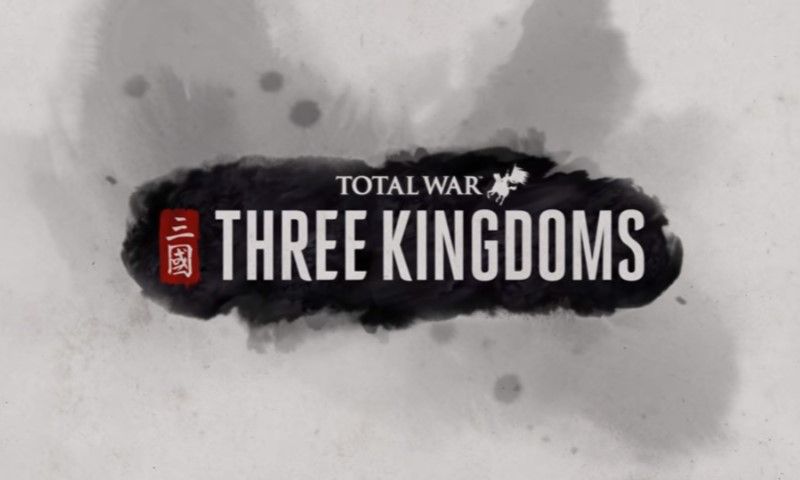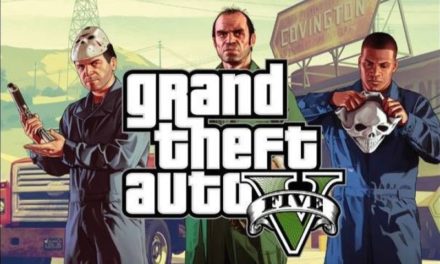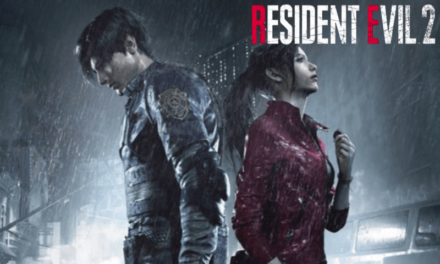Total War Three Kingdoms is an upcoming P2P real-time strategic turn-based game that is the latest title in the series by Creative Assembly. This title is based during the Three Kingdoms period of China’s history. As such, the emphasis is on developing powerful army and thriving kingdom while defending it from opposition. It requires the player to use their wits to decide who to align with, whom to go to war with, whom to threaten and who to trade with, in order to assert and grow their authority over historic China. It is due for release on March 7, 2019.
Premise
The player finds themselves in 199 C.E. in the midst of China’s Three Kingdom Era. With the murder of General Dong Zhuo by his adopted son, Lü Bu, the Han Dynasty is disintegrating, and many factions are seeing this as their opportunity to rise up and claim rulership for themselves.
Gameplay
Players will be taking on the role of one of eleven great warlords during the chaotic warring period of the Three Kingdoms. Each warlord will have a set campaign, that will branch off into two main storylines based on the decisions that a character makes. They will also have smaller decision to make which will affect their armies’ strength and diplomatic standing among their peers.
So far, little has been revealed regarding the actual mechanics of the gameplay. Whether warfare will be a simple select, point and click mechanic, or whether there will be additional options such as breaking up troops, adding extra buffs and so on is yet to be revealed. At the very least we know that when an army unit is selected, the player will be able to select the type of attack or defense that they will be implementing against opponents, as well as where the unit should go. A sample of the war gameplay can be viewed below:
Diplomacy
Total War: Three Kingdoms is implementing new diplomatic tools that are not present in their other titles. Within each location, there are various settlements ruled by different generals. Each settlement produces its own goods, and it is possible for the player to interact with them to negotiate deals or enforce tributes. There are four main diplomatic categories in the game, namely War and Peace, Trade and Marriage, Alliances and Diplomatic Treaties. Each of these has a set of subcategories, with some more peaceable than others.
However, there is a chance that offers will be rejected, so the player will need to find an offer that the other party is willing to consider. Options that are not applicable will be grayed out, but the fact that an option is available does not mean that it is a good idea. Players will need to consider their political position and resources before going trough with a deal or negotiating its terms. This is especially true where it will likely impact the warlord’s relationship to other settlements in terms of their political allegiances and their perception of the warlord’s reliability. If they are viewed as treacherous, as in they have a tendency to break their deals, then other factions will be less willing to negotiate terms. Tradable items include food, non-aggression agreements, coercive ploys, land currency and many other resources.
In previous games, the longer that a player waited to break an agreement, the lower the penalty for doing so. For instance, if a player waited ten turns before breaking an agreement, they would suffer a minor reputation decrease, but they would not necessarily make an enemy of the faction that they reneged on.
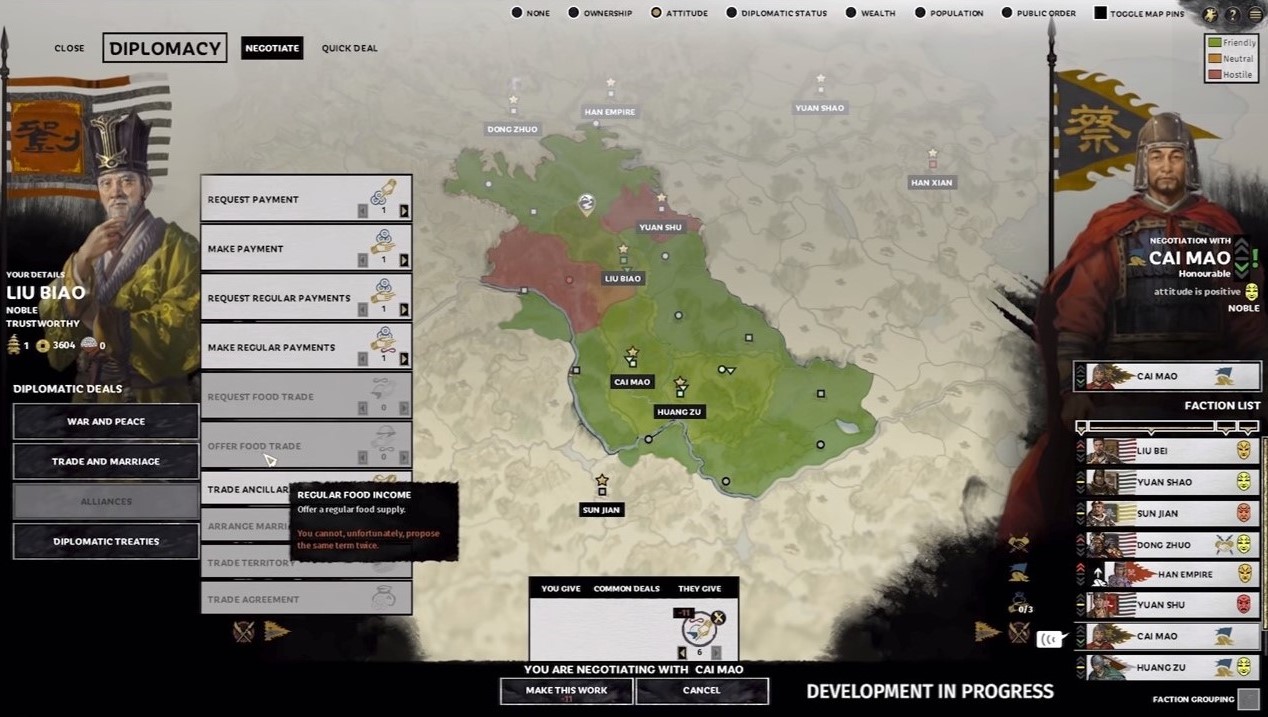
Of course, the above applies to vassal settlements and towns. There are two main types of warlord alliances in Total War: Three Kingdoms namely, Coalitions and Military alliances. These are also easily dissolved as political considerations shift and are less impacted by the private wars of the various Warlords. Each type of alliance can include multiple members, although adding new members will require the consent of other alliance members. Alliances are important not only for military campaigns, but also for mobility, as territory that is owned by alliance members will become accessible for mobility across the map, as well as for replenishing supplies.
Coalitions are the less binding form of alliances and are the most common form used early in the game and can be formed with other factions based on the player’s own diplomatic standing. Aside from the negotiated benefits of the coalition, the player’s diplomatic relationship with the Coalition members improves over time, so the longer that it is In effect, the better for the player’s warlord. Coalitions require an exchange of goods or terms, as with other agreements. If all members agree to it, these coalitions can be upgraded to military alliances. This would mean that these allies will join the warlord in their wars.
As an added requirement, the player’s warlord will need to minimally possess the ‘Marquis’ rank. It is a more binding form of alliance that will require military participation of both parties in their defensive wars. Furthermore, if some members do not wish to do participate, they may drop out of the coalition. Players can also negotiate support with private members of the alliance, without getting the entire coalition involved.
It is important to note that alliances aren’t hereditary. Therefore, if a warlord or vassal head dies, the relationship of the player’s warlord vis a vis that character may need to be re-established.
So far, it seems that it may not be possible to build settlements, meaning that it will be necessary to either conquer settlements or negotiate diplomatic agreements for relevant resources. However, there will be certain structures that can be built to provide certain boosts.
Keeping vassals happy is also important, as they can opt to leave, taking their armies with them. This can be a double-blow in the long run, should they then decide to align themselves with an enemy faction.
The Warlords
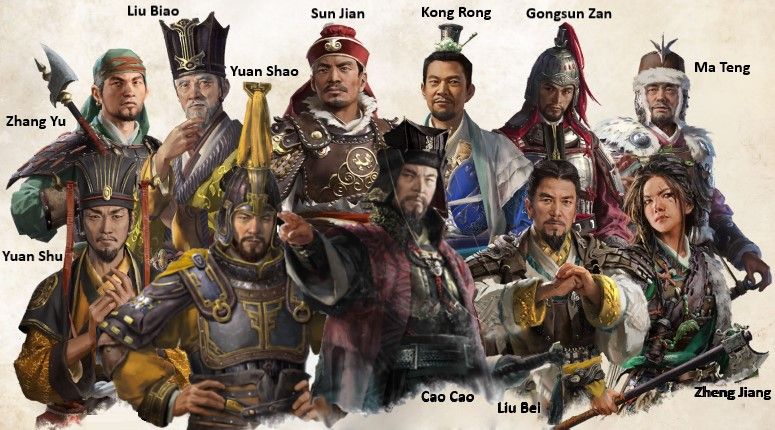
There are eleven playable warlords in Total War: Three Kingdoms. Each of these warlords has been given their own unique personalities, motivations, abilities and support boosts, with some being more heroic and altruistic, and others being more villainous. They each also receive their own campaign, with each starting in their own historic region with their own economic strengths and weaknesses, as well as political ties and opponents. As they advance in the game, they will receive skill points that can be allocated to acquire new skills or boosts. This applies to their generals as well.
Each general and warlord has a particular class that is represented by one of the five Chinese elements. These affect the skill-sets that they have, as well as the types of fighting style that they are most suited for. The five elements are: Wood/Champions – heightened personal strength, Fire/Vanguard – cavalry boosts, Earth/Commanders – authority boosts, Metal/Sentinels – melee infantry boosts, and Water/Strategists – ranged unit boosts.
In each campaign, the first part requires the player to fulfill some required tasks. Once they have done so, they will need to make a decision between two options that will determine the course of the remainder of that character’s campaign, thereby providing the possibility of playing each character at least twice for a possibility of at least 22 endings. However, alliances and also play a role in this game, and it is hinted that they could also influence the tide of the game in subtle ways, even if the player successfully completes a mission.
Modes
Romance of the Three Kingdoms Mode
This is the primary campaign mode. It was inspired by the novel, the Romance of the Three Kingdoms that was composed by Luo Guanzhong in the 14th century. As he focused on drama and heroism over historical accuracy at times, this work provided Games Workshop with incredibly powerful and talented warlords to govern the various factions in Total War: Three Kingdoms. It also allowed the game designers to give each warlord a unique set of skills, strengths, weaponry and soldiers to control, thereby offering players a diverse selection of playstyles.
Based on the Total War blog posts, it would seem that players will be given the opportunity to play through the campaign with events based on the decisions made by characters Guanzhong’s novel. Therefore, the goal of each new mission is likely to be based on the outcome of the original novel. However, as this game is inspired by the novel, so although some of the aspects are the same, the overall direction of the story depends on the decisions of the player. They will be presented mid-game with a decision that will either follow the course of events as they actually unfurled, or to follow an alternate path of how events might have developed. Therefore, although in reality two warlords may have been bitter rivals, with one brutally eliminating the other, in the game, it could be possible to alter the relationship and transform these historic rivals into powerful allies.
Classic Mode
In Classic Mode, the character stylization, weaponry armor and capabilities are more historically accurate for those players that prefer a more authentic gameplay experience. This means that ornamental weaponry and armor, as well as specialized abilities will be removed. Other changes include more organic warfare, meaning that troops and warlords will be more reactive than in the Romance mode. An example of this will be that warlords may choose to duel as soon as they encounter each other, rather than only by being prompted to do so by the player. These changes will affect the difficulty and pace of each battle, as their will be no canon-balling super-abilities to help battles along. It is unclear whether the ‘alternate decisions’ will feature in this mode.


